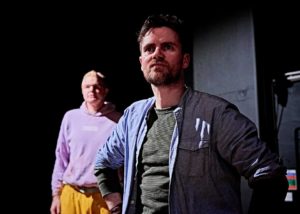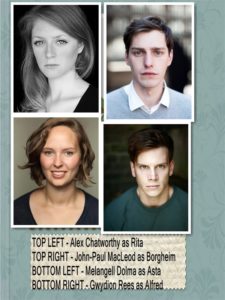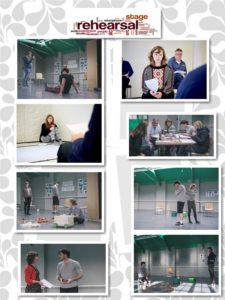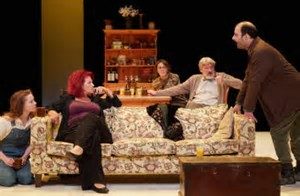
 (5 / 5)
(5 / 5)
Gary Owen and Rachel O’Riordan’s radical reimagining of Chekhov’s classic masterfully transports the narrative of The Cherry Orchard from pre-revolutionary Russia to early 1980’s Britain at the outset of the Thatcher regime. The parallels of the two landscapes, both on the cusp of societal upheaval, provides an apt setting for Owen’s exploration of class equalities, guilt and grief.
At the beginning of the play we meet Rainey, returning to the family home in West Wales and the memories of the son that continue to haunt her. With no money left and the future of their home increasingly uncertain, could an agreement with former tenant Lewis save the property from impending auction?
The one set staging creates an intimacy and surprising relatability between the family and the audience which transcends class preconceptions through the sense of a shared space which we co-inhabit over the course of the 3 hours. The clever use of space enables us to effortlessly join Anya in the Orchard, envisage the view down to the shore and experience the poignancy of Rainey and Dottie’s moment in the grounds. The presence of Josef is hauntingly conjured throughout.
Whilst Richard Mylan and Alexandria Riley provide us with a great deal of the humour throughout, it is Riley’s Dottie who most poignantly captures the extent of the injustices that class inequality can create; for in a society where time is money, who is afforded the luxury of the time to grieve? Juxtaposed with just how detrimental this ‘indulgence’ has rendered Rainey – a decade of alcoholism and guilt – we are left to un-judgingly straddle the vast void between the extremities of each’s experience.
A powerful, thought-provoking piece and one not to be missed.
Cast
Simon Armstrong
Denise Black
Matthew Bulgo
Morfydd Clark
Hedydd Dylan
Richard Mylan
Alexandria Riley
Creative
By Anton Chekhov
A re-imagining by Gary Owen
Director Rachel O’Riordan
Designer Kenny Miller
Lighting Designer Kevin Treacy
Composer and Sound Designer Simon Slater
Casting Director Kay Magson CDG

Get the Chance member Corrine Cox.
Category Archives: Theatre
Review The Cherry Orchard, Sherman Theatre by Kevin Johnson
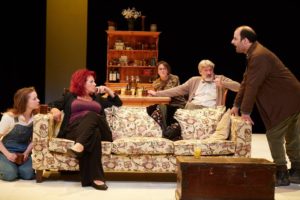
This is not a new version of the Chekhov classic, but a ‘re-imagining’ by Welsh writer Gary Owen, of Killology & Iphigenia In Splott fame. Owen relocates it from 1890’s Russia to the Pembroke coast in 1982, just prior to the Falklands War, which makes for a very interesting choice.
It feels like every dysfunctional family drama you’ve ever seen, until you realise Chekhov originated the idea of real characters, with real problems, talking like real people.
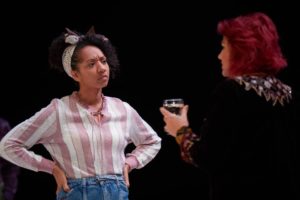
Family matriarch Rainey, who has crawled into a bottle after the death of her son over a decade ago, followed soon after by the suicide of her husband, is virtually dragged back to the family home from London by Anya, her youngest daughter. Her self-destructive lifestyle has lead to the family home on the Pembroke coast being auctioned off to pay the debts.
Val, her eldest daughter, has held things together, but they need Raynie’s permission (and signature) to save it. All agree that the only viable option is to sell off the ancestral cherry orchard for redevelopment, but will she see it that way?
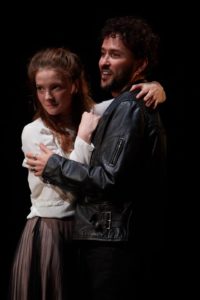
This play is incredibly funny and well-worth seeing, if only for the way Owen makes it so accessible to Welsh eyes. The ‘Russian peasants’ now come from housing estates, the decaying aristocracy are English interlopers, and the Communist revolutionaries are now Thatcherites, sweeping the past away without a thought or concern.
At the heart of the play is the idea that the future is farther away than we hope, while the past is always closer than we’d like. The characters here are continually haunted, not by spirits, but by the ghosts of memories, taunting them with remembrance.
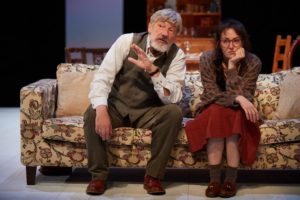
Rainey tries to forget through excess, her guilt at losing her son gnawing away at her, like a rat sown inside her skin. In the end it causes her to take drastic action, and Denise Black brings all this out in a masterful performance that makes you feel sorry for her, even while she’s being a monster to all and sundry.
The entire cast take their moments when offered, yet still make this a true ensemble piece. Morfydd Clark is sweetly sensual as the young Anya, while Hedydd Dylan as her elder sister Val, shows us a woman who tries to run other people’s lives, but fails at her own.
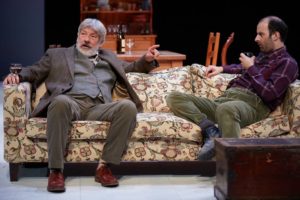
Simon Armstrong as Gabe, Rainey’s brother, is amusingly ineffectual, yet quietly sharp. When Val talks about Rainey not telling him about her plans to leave he replies “We’ve been brother & sister half a century. Through awful things. Do you think saying ‘goodbye’ makes any difference?”
Alexandria Riley gives us a Dottie that is down to earth yet shows the love/hate relationship she has with the family, while Richard Mylan is funny, while also imparting a wise naïveté to Ceri.
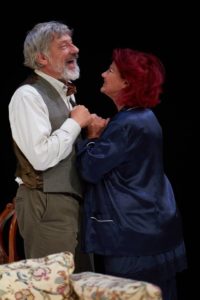
Mathew Bulgo, given the task of Lewis, the ‘poor boy made good’, effects a performance of subtlety that defies the historical villain the role has been seen as. With the insults he endures from the others, and denied the role of ‘family saviour’ by Rainey, it’s hard not to feel sympathy for him.
Writer Gary Owen conveys a situation full of layers, and also offers some nice ironies. Ceri’s expectations of Margaret Thatcher getting the blame for the Falklands War being one, Gabe’s job offer as an investment banker another.
When you add all this to Rachel O’Riordan’s deft direction, Kenny Miller’s intriguingly skewed set, and Kevin Tracey’s ingenious lighting, the Sherman Theatre demonstrates yet again that it is punching well above its weight in the theatre world.
There is so much going on here that I actually re-read the script in one go afterwards, and was still as gripped as I was by seeing it. The play is funny, ironic, witty, sarcastic and quietly heartbreaking. It is a story of loss, of people, places and things, and how memories both haunt and define us.
As F. Scott Fitzgerald once observed: ‘We beat on, boats against the current, borne back ceaselessly into the past‘.
http://www.shermantheatre.co.uk/performance/theatre/the-cherry-orchard/

Kevin Johnson
Review Of Mice and Men, August 012 by Troy Lenny
All photographs credit Studio Canno
 (4 / 5)
(4 / 5)
Of Mice and Men is a story of loneliness and misunderstandings. I remember studying this literary art in high school, but I didn’t notice the finer details, only the outline.
On Wednesday I watched Of Mice and Men presented by August 012, at Chapter ArtCentre. The outline of the story is two friends, George Milton and Lennie Small who are two workers in the Great Depression. To escape their cruel reality they share a distant dream that persuades them they will own their and land, “an’ live of the fat of the land.” This dream swirls colours of great happiness into their lives.
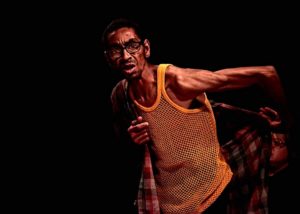
I do not want to cut curiosity out of the plot, so I will express little of this element. There are two stern problems blocking their dream. Lenny has an intellectual disability, and naively often strokes problems at work. And George and Lennie need ‘stake’ (money) from work so they can whirl their dream into reality.
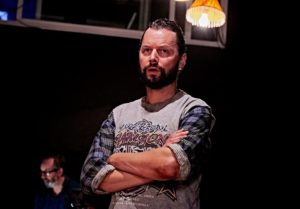
I rate this production four stars. Why? Because the production was extraordinary. It had a partial modern theme which drew out the connection that many of the problems in Of Mice and Men still exist today, if you thin your eyes. Additionally, the production style conflates imagination with reality through dreamy description and because the audience’s seats are placed on an empty stage an immersive reality surrounds you (plus you may be able to play cards with the characters!)

I would recommend anyone reading this to book a ticket, and visit the world Of Mice and Men because its performance style will enlighten tenebrous learnings. One element of the production I noticed during this production was all of the characters were Greatly Depressed, but they wiped their tears and some tried to smile and others frowned. For example: Callous Curley, always had a curled fist most likely because he felt lonely, but due to his expected masculine role he couldn’t express his feminine emotions so he was always steaming frustration. Consequently, Curley’s wife felt lonely, and wandered looking for company and due to expected feminine roles she likely thought the only way to attract a man’s attention was by swirling hips.
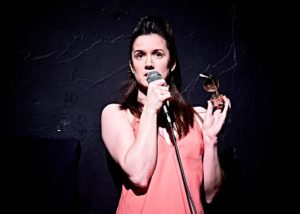
I would like to thank all involved in the production Of Mice and Men for their creative minds, and extraordinary performance style – it was striking.

Troy Lenny
An interview with Chris Durnall

The Director of Get the Chance, Guy O’Donnell recently got the chance to chat with director Chris Durnall. We discussed his career to date, his new project focusing on the BSL aspects within Tribes by Nina Raine and his thoughts on theatre in Wales.
Hi Chris great to meet you, can you give our readers some background information on yourself please?
I’m Artistic Director of Company of Sirens and also produce work under the name Winterlight. Company of Sirens stage Welsh premiers of powerful contemporary plays. Productions include Anthony Neilson’s Stitching and The Censor, Philip Ridley’s Tender Napalm, Mercury Fur and Dark Vanilla Jungle, Manfred Karge’s Conquest of the South Pole and Jennifer Haley’s The Nether.
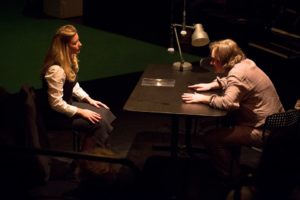
Chris in rehearsals for Jennifer Haley’s The Nether
Plus new plays by Welsh authors Ian Rowlands, Troyanne, and Sean Tyrone by Mark Ryan. Winterlight as our sister company specialise in new work that focuses on autism and disability issues. We have recently completed a trilogy of plays tracing the life of an autistic individual Matthews Passion 2013, Touch Blue Touch Yellow 2015 and Quiet Hands 2017.
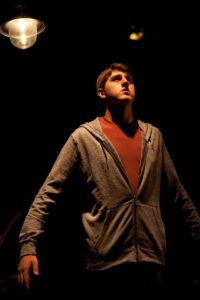
Matthews Passion
I was Artistic Director of Theatr Ffynnon for eight years working with adults with physical and learning difficulties. I also teach acting, deliver one to one sessions and freelance as a director. I was previously a professional actor for eighteen years.
So what got you interested in theatre and the arts?
Well once you get the call it’s difficult to consider doing anything else. I went to the theatre all the time when I was younger and devoured plays, often learning whole roles just for fun. When I went to drama college I was amazed by many student’s lack of interest or lack of curiosity. It was really disappointing. Having said that drama college was the happiest time of my life. I still love those people. The arts for me are split between those who dabble with varying degrees of success and those that have to do this without an option. Time and circumstances pretty soon determine which camp you are in.
Company of Sirens with the support of the Arts Council of Wales will be exploring the signing aspects of performance focusing on its use within the play Tribes by Nina Raine during October/November 2017 with support from Disability Arts Wales. Why have you chosen this as your latest production?
I wanted to explore the potential of non-verbal communication within performance. Non- verbal narrative. I believe drama lies between text and that words are often an avoidance technique to avoid and circumvent real communication.
The play Tribes fits the companies remit in terms of powerful new drama and also through the two deaf characters use of BSL within the play, helps support the other strand of my work which is about empowerment and the raising of awareness.
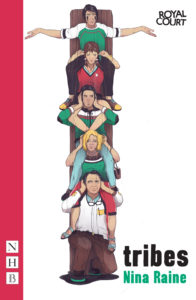
What personal knowledge do you have of theatre for deaf audiences?
My work with Theatr Ffynnon was concerned with giving a voice to the disempowered. We delivered projects through the medium of film, theatre, animation, visual art, music and poetry in order to explore routes of communication appropriate to our members and participants. The purity of their work moved me deeply and taught me a lot. We never patronised our members and listened to what they had to say as creative people. If I can merge this approach with professional actors working with a contemporary text I will be happy. In the play Tribes the deaf protagonist’s family communicate through cliché and verbal aggression. They speak in platitudes based on insecurity and often a sense of failure. Billy and his partially deaf girlfriend Sylvia communicate directly through gesture, eye contact and body language. We recognise the adage “actions speak louder than words”
Get the Chance works to support a diverse range of members of the public to access cultural provision Are you aware of any barriers to equality and diversity for either Welsh or Wales based artists/creatives?
I worry that work may be compromised by having to fit into funding priorities. It’s a question of approach. There has been a surge of work and support encouraging equality and diversity and that has been wonderful. I do believe that within this framework there should be scope for “arts for arts sake” whereby funders say we like your work, we trust your intent, go and create. I feel those times may be gone forever due largely to our culture of accountability.
There are a range of organisations supporting Welsh and Wales based artists and creatives, I wonder if you feel the current support network and career opportunities feel ‘healthy’ to you?
See above. Its great the doors are opening up but I do believe any art form moves forward through the taking of risks and a culture of experimentation. Diversity need not suffer but our artists need full creative freedom in order to create the extra – ordinary.
If you were able to fund an area of the arts in Wales what would this be and why?
Fund the risk takers and chance takers. Back the artists themselves and allow them the freedom to create
What excites you about the arts in Wales? What was the last really great thing that you experienced that you would like to share with our readers?
The amount of young companies trying to work within a difficult culture gives me hope.
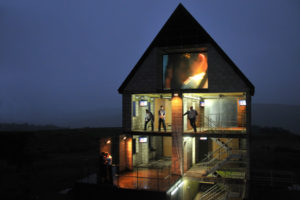
Pearson and Brooks, The Persians, National Theatre Wales.
The work of Pearson and Brooks (The Iliad and the Persians) for National Theatre Wales. Directors who try to break the mould like Mathilde Lopez. Goodcopbadcop’s experiments. Writers such as Ian Rowlands, Tim Rhys and Gary Owen are producing great work. A thriving experimental dance scene
Many thanks for your time Chris.
Preview of Little Wolf, Lucid Theatre. A retelling of Little Eyolf by Henrik Ibsen, Roger Barrington.
Little Wolf is a revision of a comparatively rarely performed 1894 play Little Eyolf by Norwegian playwright Henrik Ibsen. LUCID’s new production tours venues in South Wales in late October and November 2017 and promises to be a worthwhile enterprise.
It has been given a contemporary revision, by LUCID’s award-winning director Simon Harris.
PLOT OF LITTLE WOLF FROM LITTLE EYOLF BY IBSEN
The action is set over a period of thirty-six hours at the home of Alfred and Rita Allmers. Alfred is an occasional teacher, intellectual and landowner. Their home is located near a fjord and some distance from the nearest town, thereby emphasising Ibsen’s naturalistic style of people influenced largely by the environment they live in. Their isolation from the remainder of the community also extends to their own marital relationship, which is on a steep downward curve due to the event that had caused their nine-year old son Eyolf to be partly paralysed. The boy’s handicap having been due to him falling off a table in babyhood, where he had been left whilst his parent’s engaged in making love. The feeling of guilt over this accident provides the backdrop to the events that ensue.
THE PRODUCTION
LUCID was formed in 2012 by Simon Harris and its aims are:
- To act as a catalyst and resource for artist development
- to be a producer of innovative and distinctive theatre projects
Simon has an impressive C.V. having been associated with the National Theatre and the Soho Theatre Company as well as Artistic Director of Script Cymru the national company for new writing in Wales. In 2009, Simon won a highly-prized Creative Wales Award to enable him to develop new and innovative theatre projects.
INTERVIEW
I interviewed Simon about Little Wolf.
RB: Little Wolf is a comparatively rarely performed Ibsen classic. Why do you think that is?
SH: Well, Little Wolf is my version of the Ibsen classic Little Eyolf, and A Doll’s House, Hedda Gabler, Peer Gynt , these are the really well known plays, and Little Wolf comparatively, certainly in Wales, (I’m not aware of any productions in Wales to be honest), but comparatively in the UK, it is less performed. The peculiar thing is that when I speak to people who know the play, – I bumped into a couple of people in London, friends of mine who are directors a couple of weeks ago, and they said, “What are you doing?” and I said that I was doing this play based on Little Eyolf and they all went, “I love Little Eyolf!”, so I think part of it is that it is a challenging play in its content for some people, but it’s also an incredibly beautiful play –
RB: Yes, it’s a very intense play, I presume there is no interval, do you think the audience is emotionally able to cope with that, because it is a very demanding play on the emotions isn’t it?
SH: Well I think audiences these days are up for emotional engagement. If you look at the kind of television that people are tuning into these days, they’re sucking up the box sets, they really love the kind of deep engagement with characters they really get, and I think that this is the kind of offer that this play makes, it kinds of opens up its soul and lets you in a really profound and beautiful way. I think that this is a time when people are looking for an opportunity to empathaise and reflect a bit more, and if you compare with what is going on in the world at this moment, you know there are a lot of extremes in the world at this moment, and this is a play about the nuances of human behaviour and our ability to work through adversity towards a more hopeful position, so I think that aspect of the play that people should welcome.
RB: Going on from that, I know that the Little Eyolf play has an open ending, slightly optimistic, but it’s an ending that in 1894 when the play was written, but do you think it works well today, because the Allmers were landowners, quite wealthy people that would devote their wealth to the poor, what with a Social Security system which does that today? Do you think that translates well today, or have you done something different with it?
SH: Yes, I have done something different with it, so my connection with the play goes back a long time. I happened to see a version of it on the BBC, it’s a lovely production and I didn’t know the play at all, I didn’t know about Ibsen, but as soon as I landed on the channel that it was on, I was hooked, I was deeply deeply hooked into it and it made a lasting impression on me, so when I came to thinking about working on a new piece, I thought I would have a look at that, and when I read it I was quite surprised to see how different it was from the memory that I have of it. There were still things that were incredibly powerful and I thought very urgent and relevant, and some aspects of the play that felt very awkward to me – something that a modern audience wouldn’t identify with, so that’s why I felt that it was very important to do a different version of it, rather than a modern day version of an old play.
RB: Little Eyolf is always a play that has divided critics. I know the Ibsenist Michael Meyer regarded it as his favourite Ibsen play, and there are others who rate this at the top of the tree… Now I understand that your working is set in the contemporary day and is set in Norway?
SH: Yes.
RB: Did you consider moving the setting to Wales for example. Would it work?
SH: There is something similar about the non-conformist culture. Ibsen was fascinated about how we live, and the sometimes self-deluding behaviours that we have and hypocrisies that we have, so I think that may resonate fairly strongly for a Wales with a Non-Conformist chapel tradition. I didn’t really feel that gain that much from the setting of it in Wales. I’ve seen that done a few times, but I think it shows up some tensions in the production, and I always thought the best thing to do with it, and I’ve talked about this in one of the little films we’ve done on this on Facebook, is that we feel that we have absorbed the Norwegian culture aspect, but it’s not in your face, it’s not very overt,.
RB: I want to ask a question about Rita. She has been described as a monster, and one of the reasons why I like Ibsen is that he writes about very strong-willed heroines, I’m thinking about Svanhild in Love’s Comedy, Nora of course in A Doll’s House. How do you compare Rita to these heroines? Are you sympathetic to Rita, is she, in fact a heroine?
SH: I’m deeply sympathetic to her. I think that’s a very Victorian judgmental attitude to Rita to call her a monster. I think what is so difficult for people is that she is in a relationship with a man who is withdrawn from her, (and perhaps it’s a little more explicit in this play compared to the original), blames her conclusively for the past incidence that informs the whole of the play. Our version explores that much more comprehensively, and I think she is magnificent. She’s resilient, she’s loyal, she’s intelligent, she’s witty, she’s driven and the main thing is that she has a foundation in the love the two characters had for each other. She holds on to that. She knows what that meant in the past, and is the one who insists on it repeatedly in the play. That makes her strong. I think there’s an incredible resilience in her and it’s a beautiful journey in a way in that it moves from adversity to a new honesty and ability to move forward.
RB: Finally, I would like to ask about LUCID. Perhaps you could tell us something about the Company?
SH: This is the first theatre production of the company. We’ve been doing a variety of different works, some of it behind the scenes, working upon developing people, artists’ development, leadership development work, but I also had a piece by Chekhov that I developed as well, when I did a contemporised version of an early Chekhov play that I was interested in, so that might be something for the future. It’s early days for the company. The thing that interests me at the moment is the value of old stories. I’m slightly concerned that in the rush towards a more experiential theatre presentation. that we might lose touch with some of the dramatic traditions as well, but it doesn’t mean to say that because you interested in the dramatic tradition that it’s necessarily old-fashioned or out of date or anything else. The tradition goes back two thousand years, and I’m worried sometimes that we might be throwing the baby out with the bath water. I believe in a very pluralistic theatre culture, this work is about re-framing old stories in new urgent relevant ways. Hopefully in a way that audiences will appreciate and engage with.
RB: And presumably with the title of your company in mind, lucidity is something that you empathise in the delivery?
SH: Well I’d love that. That’s what we aim for. The LUCID name came about because I set the company up when what I considered was a lack of dialogue around what was happening in theatre, and I wanted to get people talking and thinking about some of these issues , so it was a kind of hint towards a hope for greater clarity.
RB: Thanks for your time.
Little Wolf is a rare opportunity to see a reworking of a great Ibsen play. The contemporary setting should resonate with the trials and tribulations that many of us go through in our daily life today. Ibsen was a very forward-thinking playwright for his time and his themes are as powerful today as they were when written one hundred and twenty years ago.
This promises to be an exciting production and I would urge you view it as it goes on tour around South Wales. The dates are as follows:
CARDIFF:
Chapter 20, 21, 23 – 28 October at 7.30
https://www.chapter.org/little-wolf
Post-show talk after the performance of the 23rd
SWANSEA:
Volcano Theatre 1-4, and 7-11 November at 7.30
http://www.volcanotheatre.co.uk/whats-on/little-wolf
BRECON
Theatr Brycheiniog 16 November at 7.30 and 17 November at 2
https://theatrbrycheiniog.ticketsolve.com/shows/873578721?locale=en-GB
NEWPORT
The Riverfront 22 November at 7.45
https://tickets.newportlive.co.uk/en-GB/shows/little%20wolf/info
Suitability: 14+
Duration: 90 mins (no interval)
BACKGROUND MATERIAL
Little Wolf is a vital, intense and blisteringly funny retelling of Ibsen's Little Eyolf.
Touring Wales this Autumn!@Arts_Wales_ pic.twitter.com/WqByKDZnTU— Lucid (@lucidtheatreco) September 12, 2017
https://www.youtube.com/watch?v=yZmGDzDKzWI
https://www.youtube.com/watch?v=SbOodTNGP24
https://en.wikipedia.org/wiki/Little_Eyolf
https://lucidevent.wordpress.com/about/
REVIEW: ‘SLAVA’S SNOW SHOW’ BY GEMMA TREHARNE-FOOSE

 (4 / 5)
(4 / 5)
Slava’s snowshow is completely original and unlike anything you might have seen before, although it may be triggering for those with a serious clown aversion (thanks to Stephen King and his fondness for drain-based terror!).
Polunin’s production straddles the traditional theatre show, mime, the avant garde, the clowning niche and pure spectacle. The resulting concoction is one that surprises, delights and tickles the audience. Balloons crop up here and there. A rocking horse, stars and a moon, a music box, a swing. Beautifully designed props and scenery by Ivan Yarapolskiy and Dmitry Khamzin pick at your childhood memories (and at times – your nightmares!).
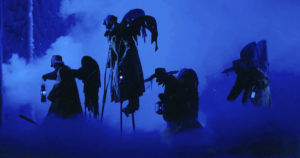
Slava’s snowshow does not have a narrative or a beginning, middle or an end. It’s actually hard to know where the vignettes and sketches will lead, but beneath the playful care-free demeanour of the show, every step, breath and look is careful, choreographed and deliberate.
An insignificant nod of a head, a wink, a snail’s pace trudge across the stage – the movements toe the line between tenderness and tragedy, laced with clownery and foolishness.
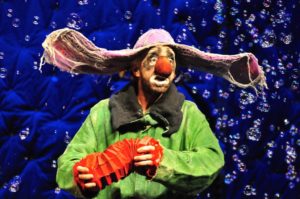
This production deliberately disrupts the frenetic pace and convention of many modern productions. It crosses the barriers between the audience and the action on stage and playfully invites adults to re-enter the colourful imaginarium of their youth.
You will instantly lower your guard, becoming absorbed in the wonder of the physicality and comic energy of the clowns the and sheer absurdity of the vignettes. But Slava’s snowshow truly succeeds in speaking to your inner child – and the sheer simplicity of this patchwork of comedy is effective and stunning.
The theatrical inspiration may have come from Chaplin, from Ukranian dramaturgs like Gogol and from street theatre and pantomime – but the language of Slava Polunin is completely universal.
The on stage action is part-dream, part-fantasy and complete spectacle. Polunin’s aim was to fuse together the tragic and the comic and create a kaleidoscope of colour, events and sound. His intention was to revitalise the way modern audiences respond to clowning…the result is more personal, more intelligent and intriguing than anything you might have experienced at a birthday party or witnessed on cheesy Saturday night TV.
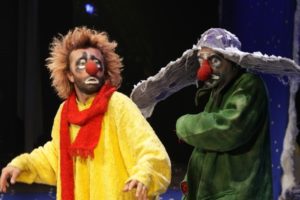
The scenes created on stage are wonderfully inventive – a bed becomes a boat, a coat stand becomes a person and curtains become snowy rocks. The action on stage spills out into the audience frequently. Slava’s clowns walk over the backs of audience chairs, a giant cobweb is passed over the heads of the audience and without spoiling any surprises – there is carnage in the theatre at the end of the show. I feel sorry for the people brushing that up!
Even if clowns really aren’t your cup of tea – this is unmissable.
4 stars
***
Type of show: Theatre
Title: Slava’s Snow Show
Venue: Wales Millennium Centre (Cardiff)
Dates: 17-21 October
Created and staged by Slava Polunin
Stage Technician: Ivan Yarapolskiy
Sound Technician: Alexey Lavrentyev
Light Technician: Alexander Iakolev
An Interview with Meredydd Barker
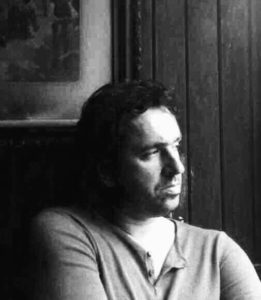
The Director of Get the Chance, Guy O’Donnell recently got the chance to chat with playwright Meredydd Barker. We discussed his career to date, ‘Nye and Jennie’ a new play he has written for Theatr na nÓg and his thoughts on theatre in Wales.
Hi Meredydd great to meet you, can you give our readers some background information on yourself please?
I was brought up on the ultra rural north coast of Pembrokeshire; potato fields, big sky and sea. My father, Gordon, was an engineer from Buxton in Derbyshire who came down to St Davids to wire up a moulding factory. Being a field sports and sea fishing fanatic he stayed. It was heaven to him. My mother, Ruth Barker, was a Welsh singer-songwriter – she was quite well known in the seventies and eighties – so the idea of self-expression through the arts was a natural one. Such a rural upbringing meant the winter nights were about reading and drawing. I was an introspective kid anyway. Somehow I got into rock music, and around the age of fourteen I read the Jim Morrison biography, ‘No-One Here Gets Out Alive.’
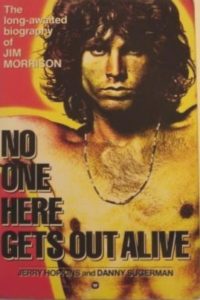
I wanted to study what he read as a teenager – the beats, French symbolist poetry et al – and so became a voracious reader. I also wrote some dreadful poetry. My other great love was visual art. I didn’t want a lecturer telling me what to read on literature course so it seemed natural to go to art college, all the while writing ideas for stories and observations in my sketchbooks. I ended up getting a degree from St Martins College in London. I did some teaching there at the Centre for Languages – mostly English to Japanese fashion students – but I wasn’t creatively happy. It was around that time I met my wife who was working at The Everyman theatre in Liverpool. I followed her there and found myself going to the theatre maybe three times a week. One night, after seeing something particularly dire on stage, I decided that I should try writing a play. I felt I could do better than what I’d just seen. So I wrote The Rabbit which was picked up by Terry Hands at Theatr Clwyd. It wasn’t only my debut but the first play that I’d ever written, so to have it directed by him ranks as one of the very most incredible things to ever happen to me. And here I am.
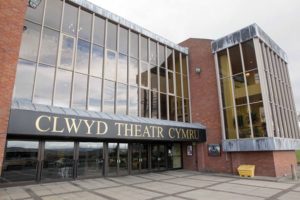
You are currently working on a new play called ‘Nye and Jennie’ for Theatr na nÓg. How did you come to be involved in this new production and can you tell us more about it?
Geinor Styles, Artistic Director of Theatr na nÓg, had read Jennie Lee’s autobiography, ‘My Life with Nye.’ She was bowled over by the story of this woman: first ever minister for the arts, prime mover behind the creation of the Open University and so much more. But she was overshadowed, as anyone would be, by Nye Bevan, her husband. Geinor had a hunch that I’d be a good fit when it came to writing a play about them. I did some reading, took a very deep breath, and said yes. It’s a two hander and so I hope the play has an intimacy in and of itself as explores what it meant to be two people in love who also happened to be creating two political legends in a time of immense domestic and international upheaval.
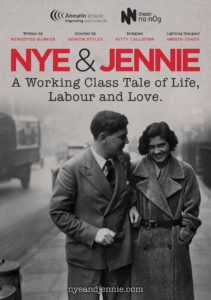
The play is described as a ‘Working class tale of Life,Labour and Love’ With the recent production of We’re Still Here by National Theatre Wales portraying the lives of Neath Port Talbot Steel Workers and this new production examining the political background and personal inspiration of Aneurin Bevan and Jennie Lee do you feel that Welsh Theatre is presenting representative stories of its citizens on our stages?
Not as much as it thinks it does. If you want to get a sense of what sort of lives people are leading you need a sense of place. The psychogeography of a play is quite fragile and it demands a sensitive touch from directors which it quite often doesn’t receive. It doesn’t survive the director’s process or vision or whatever they might want to call it. There’s no point enlisting a local playwright if an outsider is going to butcher it to fulfil their own agenda, which can often be brimful with some quite inaccurate preconceptions about a place and its people. But if those inaccuracies are camouflaged by bright lights and pretty soundscapes with a couple of laughs and a tearful middle eight then what price being representative? The five-star review is what’s important, not the lessons that may be learned. But giving the audience what it wants isn’t the same as holding up a mirror.
You’re telling a story. It’s one of many stories. But you’re telling us that this is the story that needs telling. Is that because it contains an essential truth that’s not being expressed? Or is it because it fits the world view you arrived with and you know it fits it into your particular blunderbuss of theatrical tricks? There are truths in peoples lives – the way they talk, why they say what they say, the way they treat each other with such casual brutality, the way they love – that lie at the heart and the heart is a difficult thing to get to but it’s the playwright’s job to do that. Trust the playwrights. Even if it’s difficult, even if it’s something you don’t believe, go with them.
Saying something difficult is too often seen as synonymous with courting failure, especially if the production is on large scale. But there are communities in Wales that aren’t addressing their faultlines and if theatre can’t point that out then it doesn’t deserve to call itself art because art, if it’s about anything, is about saying the difficult thing.
There are times when an outsiders point of view is exactly what’s needed. But not as often as that sentiment is used by outsiders as an excuse to defend their misconceptions. But, as I say, those misconceptions can be hidden with the smoke and mirrors of theatre with the result that nobody learns anything. There are exceptions and I’m working with an exceptional exception in Geinor and Theatr na nÓg.
The production information describes Bevan and Lee as “Aneurin Bevan and Jennie Lee were comrades and flatmates who together fought and preached for socialism as they saw it; he the Tredegar firebrand on the Labour backbenches, she the miner’s daughter from Fife who became a Socialist MP before she was old enough to vote.” Get the Chance is partially inspired from a conversation between the comedian Billy Connolly and former Scottish trade union leader Jimmy Reid. At Reid’s funeral in 2010 Connolly stated;
“I remember him saying that if you look at these housing estates and high-rise flats – look at all the windows. Behind every one of these windows is somebody who might be a horse-jumping champion, a formula one racing champion, a yachtsman of great degree, but he’ll never know because he’ll never step on a yacht or formula one car – he’ll never get the chance.”
Do you think opportunities still exist for young working class citizens from Tredegar or Fife to get the chance to actively engage in politics, the NHS or the arts today?
Two years ago I spent some time in Ebbw Vale working for the Shakespeare Schools Festival. I was able to see at first hand what the teachers in that area were like. Some were actually able to get some teaching done, but too many were just crisis managing. Provision for the arts in schools is dwindling so it’s difficult for pupils to get a good grounding in the craft. With the good grounding comes the ability to make an informed decision about whether it’s something you want to do with your life. But you need good examples to follow. Are any of the politicians around today worth emulating? There are some, but their philosophies are drowned out by the white noise most politicians mistake for public discourse. The NHS is being visibly driven into the ground in Wales so how can an adult recommend that a student devotes his or her future to something that’s being so devalued? In Fife good things are happening, but the ruling SNP is in a scrap with the Conservatives and Liberals over a new education programme which is stalling while they sort out their ideological differences. Who suffers? The pupil. Always the kids.
You are also Artistic Director of Narberth Youth Theatre. How did you come to be involved with this group?
My wife and I formed Narberth Youth Theatre because there was a need for something less formal than what the schools were offering, a place where the members could be themselves while they learnt more about theatre. Teenagers came to us and asked us to do it. And I must say it gives me the opportunity to work on my practice as a theatre maker week in, week out. We have guest facilitiators to keep things fresh and a great sense of curiosity in the group. It’s all good.
Get the Chance works to support a diverse range of members of the public to access cultural provision Are you aware of any barriers to equality and diversity for either Welsh or Wales based artists or specifically writers?
The greatest barrier is the geography of Wales itself. Just physically navigating it is hard. And theatre – like the mafia – is a face to face business. We all need to be able to go and see stuff, talk about it with the creatives, then get home. There won’t be any real consilience in Wales until that becomes easier. I scratch my head over the lack of matinees in Cardiff. In Liverpool the Everyman Playhouse has been experimenting with evening shows at 5-30 and audiences have responded positively to that. It means people from further away can get home or spend time in town and meet and talk and plan new alliances.
There are a range of organisations supporting Welsh and Wales based writers, I wonder if you feel the current support network and career opportunities for playwrights living and working in Wales feel ‘healthy’ to you?
If you’re a playwright, then you’ve made a tough choice in life. There’s only so much networks and organisations in Wales can do for a Welsh playwright. You really need to help yourself somehow. I’m forming my own company called The Holding Cell and I want see who I can attract to work with me and see if we can attract an audience because that’s what it’s all about. There are superb actors in Wales who aren’t even being seen for parts and I want to work with them, again in some cases. Let’s see what we can do for ourselves.
If you were able to fund an area of the arts in Wales what would this be and why?
Youth. It’s the law of initial conditions. Throw the ball high and hard – give it the best possible chance to travel far – then you’ll know it’ll go the distance. Invest in the beginning.
What excites you about the arts in Wales? What was the last really great thing that you experienced that you would like to share with our readers?
We’ve got astonishing actors here. That excites me more than anything else. It makes me want to write because I know that if I’m lucky enough to get into a room with Welsh actors I’m going to walk out with an enhanced piece of work. It’s happened every time. The last truly great thing that I saw was the Jean Michel Basquiat exhibition at The Barbican. In Wales, One Flew over the Cuckoo’s Nest at The Torch was ensemble work as good as I’ve ever seen.
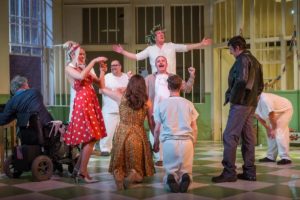
An Interview with Eric Ngalle Charles
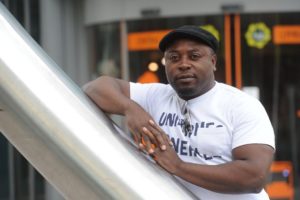
Hi Eric great to meet you, can you give our readers some background information on yourself please?
My name is Eric Ngalle Charles, I am a Cameroonian born Wales based writer poet and playwright.
So what got you interested in writing and the arts?
I wrote my first poem when I was about 8years old, I wanted to compliment my mother, for she was my father. However my mother did not understand my humour, she thought I was mocking her for the fact that many men went through her bed chambers. ‘’Dearest mother, you are beautiful like the snowflakes of Siberia, everybody knows where you are, no one dares’’ this earned me my first banishment from my village. I moved to my maternal grand father’s house where I started reading African newspapers posthumously. My maternal grandfather was a British Colonial governor and had the luxury of newspapers being delivered albeit three months late.

Your run a company called Black Entertainment Wales, an arts organisation that provides a platform for artists in the BME communities to showcase their work. Do you feel BME creatives in Wales are supported?
The bar for support for BME creatives is too high. Plus the very fact the Wales itself is a minority in the grand scheme of things means at times it doesn’t know sometimes how to deal with its BAME creatives. Organisations are making strides in the right direction, I am now on the board of directors for Literature Wales, We have FIO making strides, and we have support from other creatives like Charlotte Williams and Isabelle Adonis. There’s hope.
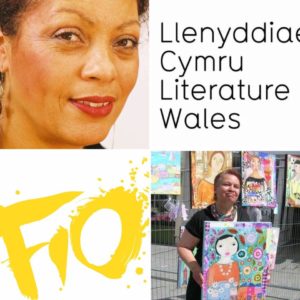
You are also a playwright how do you approach writing in this art form?
I guess I am fascinated by ‘’blindness’’ What can provoke someone or something to invoke blindness from the gods. I am not an ‘’OBWANJE CHILD’’ as described by Ben Okri in Famished Road, however I carry such marks, and I strongly believe that we must not cut off that link between the land of the dead and that of the living. I write to maintain the link. In most of my plays, I perform rituals, either through singing an ancient song that my ancestors used when communicating with the gods, or simply pouring liquor or water onto the ground and invoking the gods. During my last performance in Palas Print Caernarfon for the Literature festival in June with Ifor Ap Glyn the National Poet of Wales, I performed Molikilikili (stick insect, who insist on bringing down the great Iroko tree by pushing it to the ground, most people mistook its antics for press-ups) and I did an invocation using Welsh leaves and Welsh water. Yes, the gods are playwrights, they use us to poke fun and make merry.
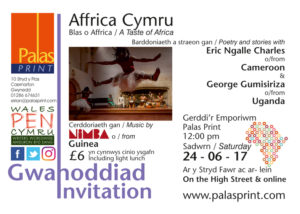
Get the Chance works to support a diverse range of members of the public to access cultural provision Are you aware of any barriers to equality and diversity for either Welsh or Wales based artists/creatives?
The way information is dispersed, community centers, libraries are not stocking the right information, and institutions that have powers that control information on activities do not have foot soldiers. There is disconnect between creatives and those institutions that should support them.
There are a range of organisations supporting Welsh and Wales based artists and creatives, I wonder if you feel the current support network and career opportunities feel ‘healthy’ to you?
Two of such organisations have been helpful and healthy to me because I am very persistent, other people once you knock them they lose the ability to stand up. I believe in the power of my story, I know what I write and I am willing and learning to learn how to write.
If you were able to fund an area of the arts in Wales what would this be and why?
Public performance arts. We should encourage young and emerging talents to showcase their work and to get paid for doing so.
What excites you about the arts in Wales? What was the last really great thing that you experienced that you would like to share with our readers?
Event’s organizers such as the Hay Trust, Hay Festival are embracing diversity, for me I am currently talking with the National Trust to see if I could perform my plays around their various premises. I just came from Cameroon last month as part of a ‘’Bridge Building’’ initiative supported by Wales Arts International which will see Artists from Wales going to Cameroon and Vice versa. As a result of my first visit, I have been invited back to Cameroon by the authorities to perform at the South Cameroon Cultural Festival. Effectively I am passing the baton to the future generation.
Review The Rise and Fall Of Little Voice, Theatr Clwyd by Karis Clarke
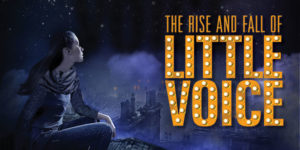
 (4 / 5)
(4 / 5)
As a critic I am not technically minded, I view a play and my mind will automatically focus on the acting ability of the cast , as my background is in performing. However it would be impossible not to be blown away by the genius set design and the technicality of this production.
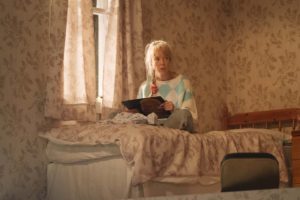
Using a revolving room on a split level, and a dividing floor the design by Amy Jane Cook easily managed to give the illusion of an open dolls house. (If the dolls house was a northern council house with poor electrics and bad house keeping!) This enabled the lounge, kitchen diner and bedroom all to be in full view of the audience. With swift transitions the bedroom revolved, the living room divided and the set transformed to Mr Boo’s night club. The first transition took place just after the beginning of the second half and was met with suitable gasps of awe from the impressed full house.
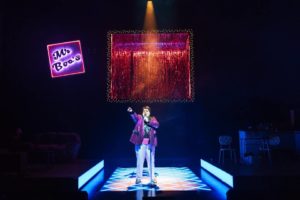
It would be rude not to give credit to the lighting design, by Nicholas Holdridge although naturalistic in nature a majority of the play took place in dimly lit rooms and at one point darkness. However the clever use of street, moon, dawn and torch light ensured the actors were always well lit and the tone and atmosphere were heightened. This combination of stage and technical magic combine in the final stages of the production, not wanting to spoil the effect -Theatre Clwyd’s production does stay true to the film and they do so very effectively. A combination of smoke, lights movement and LV’s impressions as she reaches breaking point culminates to an intense stage experience.
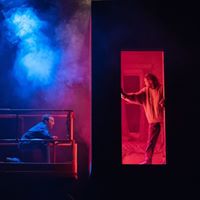
The cast were as impressive as the set, comic timing, physicality and delivery were strong. Each member of the small ensemble allowed each other to have stand out moments as well as ensuring they all worked well together to perform some very funny dialogue, comedic banter and duets. (watch out for Nicola Reynolds, Mari Hoff, LV’s mum and the brilliant Victoria John, Sadie, the down beaten neighbour performing “It’s Raining Men”)
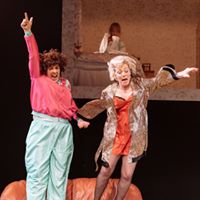
This play can only work if LV can actually deliver the impressions stated – ergo this play works. It has been stated on social media that when Catrin Aaron sings its like Judy Garland is in the room. I fully agree – except Shirley Bassey, Marilyn Monroe and a host of others are there with her.
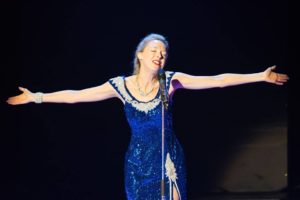
I was slightly disappointed with some of the direction of the play, continuity of stage exits occasionally seemed haphazard – this could be due to them being sacrificed for the technicality of the production – in which case I can forgive the occasions when walls are walked through – however towards the end of the play it felt like the cast had forgotten where doors were and they were just walking wherever!
Jim Cartwright’s script is undoubtedly witty and gritty and is supposed to be full of hilarity and vulgarity, however, I was waiting for the all important point when I would feel empathy with the characters, for me, it didn’t happen. I put this down to the direction of Wasserberg rather than the acting ability of the cast. It was played for laughs and in doing so the characters became more caricatures – that although I laughed with, I never fully connected with.
Other than this, it was a pleasure to watch, strong female leads and the standing ovation was justly deserved. Little Voice hits the right notes.
Theatre Clwyd, Antony Hopkins Theatre,Tuesday 10th October . Directed by Kate Wasserberg
Review ‘The Rise and Fall of Little Voice’ Theatr Clwyd by Bethany Mcaulay

 (4 / 5)
(4 / 5)
“Director Kate Wasserberg masterfully merges the humorous with the harrowing in Theatr Clwyd’s current revival of Cartwright’s ‘The Rise and Fall of Little Voice.”
The script itself – scathingly raw and rife with a complex combination of dark humour and revolting sexual innuendoes, though nevertheless appealing and often rich with tenderness and sentimentality – is conveyed with tremendous sensitivity by each performer. So much so that each of the actors – all brilliant – all awe-inspiring, perform with such a natural truthfulness, that I remain wholly entranced by each throughout this production.

The set was intricate and intriguing – with the placement of LV’s personal space and the remainder of the house distinctly separate and isolated. Impressively, the mere house was swiftly transformed into a spectacular nightclub.
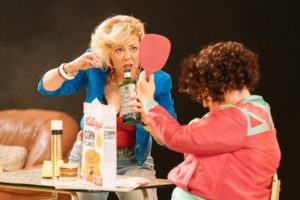
However, it is Nicola Reynold’s performance as Mari, which was, above all else, an afflicting depiction of vulgarity and vulnerability. Initially, I deplored Mari’s neglectful and resentful attitude towards her daughter, but her gradual deterioration and eventual breakdown left me empathetic and with an aching heart. Though, sometimes I felt her performance to be too intensely revolting.
The character of Billy, though perhaps not the most significant character of the play, this particular interpretation shines with an awkward charm and perfect like-ability.

Though, undoubtedly, it was Catrin Aaron’s LV, arguably echoing the brilliance of Jane Horrock’s earlier performance of the same character that demanded recognition for its exceptional, glorious splendour. Shifting effortlessly from meek to magnificent, with impersonations that could quite truly be mistaken for the voices of Garland, Monroe and Piaf.
The production plays until the end of October at Theatre Clwyd.

